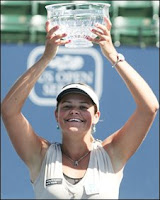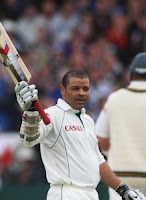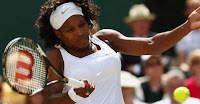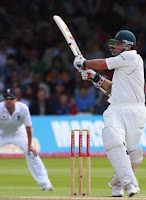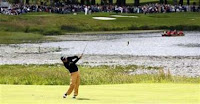
By PAUL NEWBERRY, AP National Writer
ATLANTA (AP)—When Eric Shanteau touched the wall second at the U.S. Olympic trials, he was overcome by the joy of reaching a lifelong goal.
The celebration didn’t last long.
Shanteau had barely locked up his trip to Beijing when he was forced to deal with a gut-wrenching choice: Should he have surgery for the testicular cancer hardly anyone knew about? Or, should he put it off for another month so he could swim at his first Olympics?
Shanteau chose the Olympics. Surgery will have to wait.
In an exclusive interview with The Associated Press, Shanteau said he learned just a week before leaving for the U.S. Olympic trials that he has cancer.
“I was sort of like, ‘This isn’t real. There’s no way this is happening to me right now,”’ he said by telephone from the team’s pre-Beijing training camp in California. “You’re trying to get ready for the Olympics, and you just get this huge bomb dropped on you.”
His doctors cleared him to compete at the trials in Omaha, Neb., determining he wouldn’t be at great risk to delay treatment. Then, Shanteau surprisingly made the team in the 200-meter breaststroke, finishing second ahead of former world-record holder and heavy favorite Brendan Hansen.
He’s putting off surgery until after the Olympics because it would keep him out of the water for at least two weeks, ruining his Beijing preparations. The 24-year-old Georgia native will be monitored closely over the next month by U.S. Olympic team doctors and vows to withdraw if there’s any sign his cancer is spreading.
“If I didn’t make the team, the decision would have been easy: Go home and have the surgery,” said Shanteau, who grew up in suburban Atlanta. “I made the team, so I had a hard decision. But, by no means am I being stupid about this.”
Still, there are no guarantees.
“With any cancer, you want to find it early and treat it early for the best outcome,” Dr. Brett Baker, the Austin, Texas-based urologist who delivered the news to Shanteau, said Friday. “That was my recommendation. It’s difficult to say in his scenario what to expect. The risk, of course, is that time is an opportunity for disease progression.”
Seeking out advice from team doctors and other outside experts, Shanteau came up with own plan. He will have his blood tested once a week and a CT scan done every two weeks through the Olympics, hoping that will be enough to keep a handle on the disease.
“If something comes up abnormal,” he said, “then that’s kind of a barrier I shouldn’t cross.”
In most cases of this type, Baker said it’s impossible to know for sure exactly what type of testicular cancer the patient has—or, even the very slight chance that it’s not cancer at all—until the tumor is removed surgically for a biopsy.
“Sometimes, the best decisions are not always exactly the way the doctor sees it,” Baker said. “I don’t consider him crazy at all. I think if he’s happy and content with playing it out this way, that’s the most important thing.”
If Shanteau can’t compete, the Americans would add Scott Usher as their second swimmer in the 200 breast. The third-place finisher in Omaha was told of Shanteau’s condition the day after the race and encouraged to keep training.
“I’ve been trying to play in my head what I would do in his situation,” Usher said Friday before heading to a solo training session at Purdue University. “I don’t know if I would have taken the same route he has, to be honest. … Cancer is not something you want to mess around with.”
It was found after Shanteau noticed an abnormality and was finally persuaded by his girlfriend to see a doctor in Austin, where he trains on a star-studded team that includes Hansen, Ian Crocker and Aaron Peirsol.
On June 19, exactly one week before he was scheduled to leave for the trials, Shanteau heard that awful word.
Cancer.
“It almost numbed me,” he said. “I’ll remember that day for the rest of my life. Talk about a life-changing experience. That’s as big a one as you can have, I think. You’re changed for the rest of your life.”
If everything had gone according to expected script in Omaha, Shanteau would have already gone through surgery and be on the road to recovery. But the improbable happened in the 200 breaststroke, where Hansen—considered a lock to make the team—faded badly on the final lap. Scott Spann powered by to win the race, and Shanteau passed Hansen as well to claim the second spot on the team.
Shanteau was going to the Olympics.
But his thoughts quickly shifted to the cancer.
“A lot of people kept asking me after that race, ‘What was going on? We thought we would get a little more reaction out of you,”’ he said. “That kind of made it a little bittersweet. It went well. I made the team. Then I had to go back and deal with reality.”
Only a few close friends and family knew about Shanteau’s condition before the Olympic trials. He decided to go public with his story because he hopes to inspire others with cancer.
According to the National Cancer Institute, testicular cancer is relatively rare, accounting for 1 percent of male cancer cases in the U.S. It’s often diagnosed in younger men. About 8,000 men are diagnosed and 390 die from the disease each year.
The cancer is usually slow to spread and highly treatable, but follow-up care is extremely important because of the risk of recurrence, the NCI said. Surgery to remove the affected testicle is the most common form of treatment.
Mark Schubert, head coach and general manager of the U.S. team, supports Shanteau’s decision to swim in Beijing.
“Eric is handling this situation with courage and poise, and his decisions to compete at the Olympics and to share his story for the benefit of others, are evidence of that courage,” Schubert said. “While we are hopeful that he will be able to compete, Eric’s heath remains the absolute top priority.”
Shanteau’s camp already has heard from the agent of Lance Armstrong, who overcame the same disease and won the Tour de France seven straight times.
“Lance’s agent told my coaches that I’m the closest thing to Lance Armstrong that there is on the planet right now,” Shanteau said. “If I can have a fraction of the impact that he’s had, just a tiny little bit, then I think what I’m going through will be good.”
Up to now, Shanteau’s biggest international accomplishment was finishing fifth in the 200 breaststroke at last year’s world championships in Australia. He faces long odds to make the medal stand in Beijing, having posted only the ninth-fastest time in the world this year.
“Making the Olympic team was the hard part,” he said. “The Olympic Games should be fun. I’m not worried about swimming fast there.”
At the trials, Shanteau couldn’t help but think about his disease when outside the pool. He put it aside as soon as he entered the water, however.
He expects it will be the same in Beijing.
“I want the swimming aspect so badly,” Shanteau said. “I know what I’m risking … but it’s basically just a longer recovery time. After the Olympics, I’ll have nothing but time. That’s why it wasn’t too hard to make this decision.”
Source: Yahoo! sports.
 (BEIJING, July 31) -- Chen Guoying, mayor of Tangshan, lit the cauldron at Caofeidian Island Hotel Square at 12:05 on Thursday, bringing the Tangshan leg of the Olympic Torch Relay to an end. This is also the last stop for the sacred flame in Hebei Province.
(BEIJING, July 31) -- Chen Guoying, mayor of Tangshan, lit the cauldron at Caofeidian Island Hotel Square at 12:05 on Thursday, bringing the Tangshan leg of the Olympic Torch Relay to an end. This is also the last stop for the sacred flame in Hebei Province.
